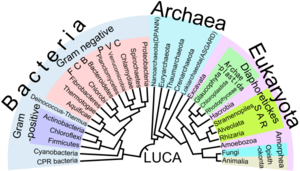 The simple answer is “Fear”. Creationist arguments are very often bracketed with gospel messages, and ever since Darwin’s day the lines have been starkly drawn. Religious fundamentalists fear that “belief in” evolution leads to a rejection of God, a rejection of godly values, a loss of any higher meaning or purpose for human existence, an ethic of bullying and of a “me-first” struggling for survival. The scientific arguments are secondary, if they matter at all. Hence popular fallacies about evolutionary theory are still proclaimed as facts by Creationists regardless of their having been established as fallacies ever since the days of Darwin himself. What really is at stake is the fear that evolution means there is no need for God or biblically prescribed morality, and that faith and purpose are all lost.
The simple answer is “Fear”. Creationist arguments are very often bracketed with gospel messages, and ever since Darwin’s day the lines have been starkly drawn. Religious fundamentalists fear that “belief in” evolution leads to a rejection of God, a rejection of godly values, a loss of any higher meaning or purpose for human existence, an ethic of bullying and of a “me-first” struggling for survival. The scientific arguments are secondary, if they matter at all. Hence popular fallacies about evolutionary theory are still proclaimed as facts by Creationists regardless of their having been established as fallacies ever since the days of Darwin himself. What really is at stake is the fear that evolution means there is no need for God or biblically prescribed morality, and that faith and purpose are all lost.
Michael Shermer in Why Darwin Matters quotes extensively from William Jennings Bryan of Scopes trial fame in support. One example:
The real attack of evolution, it will be seen, is not upon orthodox Christianity or even upon Christianity, but upon religion — the most basic fact in man’s existence and the most practical thing in life. If taken seriously and made the basis of a philosophy of life, it would eliminate love and carry man back to the struggle of tooth and claw. [Closing statement of WJB in Scopes trial, 1925 — p. 23 of Why Darwin Matters]
Shermer cites the syllogistic reasoning thus (p. 24):
Evolution implies that there is no God, therefore . . .
Belief in the theory of evolution leads to atheism, therefore . . .
Without a belief in God there can be no morality or meaning, therefore . . .
Without morality and meaning there is no basis for a civil society, therefore . . .
Without a civil society we will be reduced to living like brute animals.
This is what bothers people about evolutionary theory, not the technical details of science. Most folks don’t give one whit about adaptive radiation, allopatric speciation, phenotypic variation, assortative mating, allometry and heterochrony, adaptation and exaptation, gradualism and punctuated equilibrium, and the like. What they do care about is whether teaching evolution will make their kids reject God, allow criminals and sinners to blame their genes for their actions, and generally cause society to fall apart.
Where did they get such an idea?
The fact is, of course, that belief in God and the Bible or Koran or any other religion does not guarantee moral behaviour, and “accepting evolution does not force us to jettison our morals and ethics” (p.29). The Bible Belt of America is notorious for its violent crime rate and premarital pregnancy statistics. International crime statistics do not show special favours for Christian nations. I lived many years in country town Toowoomba which is dominated by very conservative Christian stakeholders, yet is also the unfortunate recorder of child abuse and domestic violence statistics among the worst nationally.
Believe in God, but Accept Gravity . . .
Michael Shermer suggests that one of the obstacles to accepting evolution for some people is that they feel they are being asked to make a choice between “believing in” God or evolution. Shermer comments:
evolution is not a religious tenet, to which one swears allegiance or belief as a matter of faith. It is a factual reality of the empirical world. Just as one would not say, “I believe in gravity,” one should not proclaim, “I believe in evolution.” But getting hung up on the idea that one is supposed to “believe in” evolution just as you “believe in” God is just one brand of resistance to evolution. (p. 30)
Shermer lists five specific reasons he believes people resist the theory of evolution (pp.30-32) — the comments are a mix of Shermer’s and my own:
1. A general resistance to science
People generally choose their religion over science, especially if they think they must opt to “believe in” one or the other. If they generally use the findings of science as supports for their religious beliefs, many religious opt to reject any scientific finding that does not support their beliefs.
2. Belief that evolution is a threat to specific religious tenets
Many religionists dismiss the geological evidence that the earth is 4.6 billion years old and reinterpret other evidence to support their belief that the earth is less than 10,000 years old.
3. Fear that evolution degrades our humanity
Shermer observes that it is one thing for science to discover that the earth is not the centre of the universe and that is one of many planets orbiting countless suns, but it is quite another order of consciousness to think that humans might be subject to the same natural laws and natural history as other animals.
4. Equation of evolution with ethical nihilism and moral degeneration
Some people who rely on hope and revelation from higher beings for a sense of purpose and moral direction cannot imagine a meaningful and ethical life unless without a belief in God.
Comment: On the other hand many find a deep sense of purpose and basis for moral behaviour by seeing themselves as part of humanity alone. The fact that life is so temporary and unpredictable is strong incentive to make the most of our time here and now, and that includes finding a rewarding and worthwhile life through promoting and doing whatever might enhance the well-being of our fellow-beings. By identifying ourselves with our species lifts us out of more parochial self-identities based on race or any other narrow grouping. Species-identity (or what was once in less politically correct days called “the brotherhood of man” idea) gives us a higher view of our place in the world, and encourages a life in pursuit of humane causes and actions.
Evolution also explains good and evil, and offers sure foundations of ethical behaviour. People are both selfish and unselfish as a result of how each attribute has equipped us for survival as a species. Selfishness has enabled us to protect ourselves and our families or groups to survive against enemies and competitors, while unselfish acts have enabled us to cooperate as larger social units, from families to village communities. And we also have the ability to reflect on our behaviours and work at modifying or controlling them. All societies have prohibitions against murder, adultery, stealing and lying. This is because no society would be possible otherwise. And humans are among the most social of animal species. Murder obviously cannot be tolerated if people are to live together; and trust must be established between people for communities to thrive. Religions may have codified such innate views of right and wrong behaviour, but the fact that such ethics are found across all societies shows that no particular religion is necessary to inform people that such things are right or wrong.
Fundamentalists will generally point to all the negative news and behaviours in our midst, often as a sign that we are now in “the last days”. Yes there is much evil in the world, but the fact that we can view the world from within stable communities demonstrates that evil is not the whole story. For every rude person on a train who does not give up his seat for an elderly or other needy person, I have seen dozens who do give up their seats. For every time I have been spoken to rudely by strangers or colleagues, there are scores of times I have been treated with friendliness. Most people really do like to help others when given an opportunity. And it has nothing to do with their religious or nonreligious beliefs. Or at least the same is found among people whether they be Buddhists, Hindus, Christians, or “Other”.
5. Fear that evolutionary theory implies we have a fixed human nature
There is also a common fear that acceptance of evolution will mean that criminals can plead responsibility lay with “their genes” for their actions. Personal responsibility will be a thing of the past.
Comment: But people will always be held responsible for their actions, and this is a basic fact of all societies. (See “why oppose . . .“). Science may well discover certain inherited conditions that predispose a person to a certain type of behaviour (e.g. to be quick to lose one’s temper) but societies always hold each member responsible for their actions. Awareness of predispositions enables both individuals and a society to assist in treating such conditions and avoiding catalyst situations, as well as in deciding the most appropriate punishment or other response to intolerable behaviours.
The urge to rape may in our distant past have had some value to enhance the survival of our species, but we have — through our social natures — reached a point where we have been able to reflect on our actions and their consequences, and learn to control our feelings and build up social fences that encourage (or threaten) members of our community to fall into line, too.
(Related post The Voyage That Shook the World)
Like this:
Like Loading...











